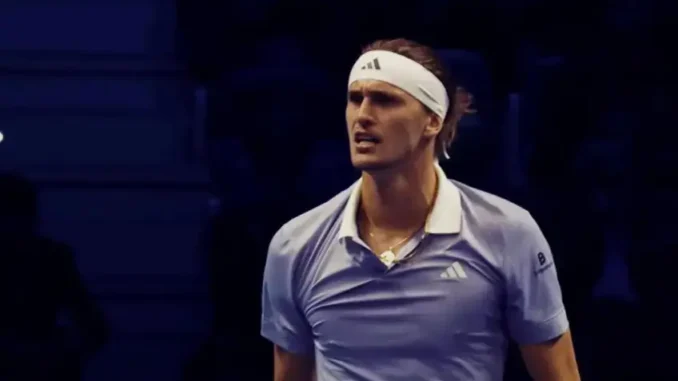
Andy Roddick, one of the most prominent servers in tennis history, has made a striking statement about Alexander Zverev’s serve, calling it the most effective in the world. For fans of the sport, such praise from a former world No. 1 and US Open champion carries significant weight, sparking conversations about Zverev’s place in the hierarchy of modern tennis.
Zverev’s serve has long been a defining aspect of his game, and Roddick’s endorsement adds to the recognition of its importance. As one of the most dynamic players on the ATP Tour, Zverev has consistently used his serve to dominate opponents, setting the tone for his matches with precision, power, and variety. At 6’6”, the German possesses a natural advantage in generating pace and angles, which he combines with a fluid motion to deliver one of the most formidable serves in the sport today.
Roddick, who once held the record for the fastest serve in tennis history, knows a thing or two about the art of serving. Throughout his career, Roddick relied heavily on his serve to win quick points and keep pressure off his ground game, a strategy that brought him 32 ATP titles and a Grand Slam crown. His acknowledgment of Zverev’s serve as the best in the world underscores the technical brilliance and effectiveness of the German’s delivery.
Zverev’s serve stands out not just for its raw speed but also for its strategic application. He is adept at mixing up his placements, often catching opponents off-guard with serves that stretch them wide or force them into awkward positions. His ability to hit aces under pressure, combined with a strong second serve that limits double faults, gives him a decisive edge in tight situations. It is this blend of power, accuracy, and tactical intelligence that Roddick likely admires and deems world-class.
The German’s serve has played a pivotal role in many of his most significant victories. Whether it’s closing out tight sets in tiebreakers or recovering from break-point deficits, Zverev has repeatedly demonstrated his ability to rely on his serve when it matters most. This reliability has been a cornerstone of his rise to prominence, earning him a spot among the sport’s elite and a slew of Masters 1000 titles.
However, Zverev’s journey with his serve has not been without challenges. In the early stages of his career, he struggled with consistency, particularly on his second serve, which often led to an unusually high number of double faults. Critics questioned whether he could develop the mental toughness and technical precision required to maximize the potential of his serving game. Over time, though, Zverev has silenced many of those doubts, refining his mechanics and adopting a more composed approach under pressure.
Roddick’s recognition of Zverev’s serve comes at a time when the German is working hard to reestablish himself as a dominant force on the tour. After enduring a challenging period, including injuries that sidelined him during critical parts of the season, Zverev has been steadily regaining his form. His serve has remained a cornerstone of his game, allowing him to stay competitive against top-tier opponents and build confidence in his overall performance.
Zverev’s serve is often compared to those of other big servers on the tour, such as John Isner, Nick Kyrgios, and Matteo Berrettini. While Isner is known for his sheer power and Kyrgios for his unpredictable placement, Zverev’s serve is unique in its combination of these elements. His ability to seamlessly transition from a powerful first serve to a dependable second serve sets him apart, ensuring that he remains a constant threat in his service games. This versatility also makes it incredibly challenging for returners to develop a rhythm against him.
Roddick’s statement also highlights the broader evolution of serving in modern tennis. The serve, once considered primarily a weapon of raw power, has transformed into a more nuanced aspect of the game. Players like Zverev have redefined the role of the serve, emphasizing not only speed but also spin, placement, and strategic variations. This evolution reflects the increasing sophistication of the sport, where even the smallest advantages can make a significant difference at the highest levels.
For Zverev, such high praise from a tennis legend like Roddick is both a validation of his hard work and an incentive to keep improving. The German has expressed his desire to win Grand Slam titles and establish himself as a consistent contender for the top spot in the rankings. With a serve that is now widely regarded as one of the best, if not the best, in the game, he has a critical tool to achieve these ambitions.
Looking ahead, Zverev’s serve will continue to be a focal point in his quest for greater success. As the competition in men’s tennis intensifies, with established stars and emerging talents vying for supremacy, the ability to dominate service games becomes even more crucial. Zverev’s serve gives him a distinct advantage in this regard, enabling him to dictate play and keep matches on his terms.
Roddick’s assessment also serves as a reminder of the enduring impact of great servers in tennis history. From Pete Sampras and Goran Ivanišević to Serena Williams and Roger Federer, the serve has always been a defining weapon for champions. Zverev’s serve, with its blend of power, precision, and reliability, places him in the lineage of players who have mastered this critical aspect of the game.
As fans and analysts digest Roddick’s comments, the spotlight on Zverev’s serve will undoubtedly grow. Whether in high-stakes Grand Slam matches or on the ATP tour, his ability to deliver under pressure will remain a key storyline. For Zverev, the challenge now is to build on this recognition, continuing to harness the full potential of his serve while striving for even greater consistency and success.
Leave a Reply